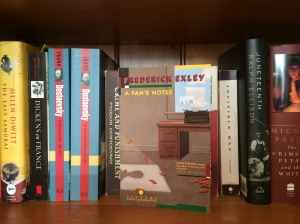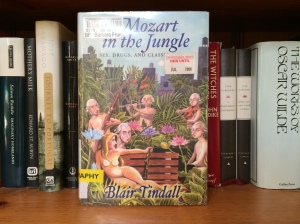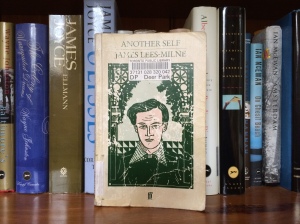
François-René de Chateaubriand, Memoirs from Beyond the Tomb (1850)
Canada has an interesting presence in French literature. Based on my (admittedly limited) reading (further study is needed, as they say) our country seems to be much more in the minds of earlier writers (i.e. in the 17th and 18th centuries) than in the minds of 19th-century authors. I suppose this makes sense in that references to Canada dwindle in French literature after France loses its colonial interest in our country; still, it feels counterintuitive, somehow, that when, in the 19th century, we would expect Canada’s profile in Europe to be growing, in France, at least, it seems to be shrinking.
Chateaubriand’s Memoirs from Beyond the Tomb enacts this process in miniature: there are a number of references to Canada in the early parts of the book, which deal with the last couple of decades of the 18th century; as the book proceeds into the 19th century, however, Canada vanishes from the narrative and European matters take up Chateaubriand’s attention. (I should also mention that the Penguin edition I read (pictured above) contains only selections from the book, so there may be later references to Canada that weren’t included.)
The “Father of French Romanticism” Considers a Career as a Lumberjack
This passage relates a discussion between Chateaubriand and his parents about what career path he should choose (it’s basically down to the army or the church):
I hit on an absurd idea: I declared that I would go to Canada to clear forests or to India to join the army of one of the princes of that country.
By one of those contrasts which are to be found in all men, my father, normally so reasonable, was never greatly shocked by an adventurous project. He grumbled to my mother about my changes of mind, but decided to despatch me to India. I was sent off to Saint-Malo, where a ship was being fitted out for Pondicherry. (71)
It’s hard to know how seriously to take this suggestion of going to Canada “to clear forests”; the author himself calls it “absurd,” and it may be no more meaningful than a modern teenager’s threat to run away from home if they don’t get their way. Still, the idea of Canada as a wilderness of trees needing to be cut down is apparently already firmly established, and while Chateaubriand doesn’t use the word “lumberjack,” we can see the outline of that quintessentially Canadian figure hovering in the background.
This perceived lack of civilization is in marked contrast to the impression we get of India, where apparently there are princes with armies on the move — something much more aligned with the activities of European men in the late 18th century. It’s perhaps not surprising that Chateaubriand’s father in the end chooses the aristocratic pursuit of war-making for his son rather than the more laborious job of tree-cutting.
A Country that Keeps Getting In the Way
But Chateaubriand didn’t just fantasize about running away to Canada; after the French Revolution, he actually came here. (You can get a sense of his overall impression from two quick facts: the chapter of his book that includes the trip to Canada is called “Among the Savages,” and the phrase “the Canadian forests” comes up repeatedly.) His reasons for the trip were, first, to see the United States (not Canada), and second, to discover the Northwest Passage, which he seems to have thought would be a fairly simple matter.
Before he reaches North America, however, his ship encounters some difficulties due to wind and weather. Instead of arriving in the U.S., he finds himself off the coast of Canada, as if our country were somehow preventing him from reaching his destination. This is part of a description of the journey after a stop-off on the island of Graciosa:
The wind forced us to bear north, and we arrived at the Banks of Newfoundland. Some floating icebergs were drifting around in the midst of a pale, cold mist. (123)
It’s pretty clear that Newfoundland is not where he wants to be, and the description has a compressed quality that shows a distinct lack of interest. This vision of Canada is probably more or less what a European of the period would imagine: a few icebergs and a cold mist — which isn’t so bad since there’s nothing to see anyway. What do these French sailors do now that they have arrived on the shores of Canada? They beat a hasty retreat to the nearest French possessions:
We steered for the islands of Saint-Pierre and Miquelon, looking for a new port of call. (124)
In fairness, Canada isn’t really his object, so perhaps we shouldn’t judge him too harshly.
What’s The Opposite of “Civilizing”?
They make it to Saint-Pierre and Miquelon, and Chateaubriand strikes up a bit of an acquaintance with the Governor there:
I dined two or three times with the Governor, an extremely polite and obliging officer. He grew a few European vegetables on a slope outside. After dinner she showed me what he called his garden. A sweet, delicate smell of heliotrope came from a small patch of flowering beans; it was not wafted to us by a gentle breeze from home, but by a wild Newfoundland wind which had no connexion with the exiled plant, no attractive element of reminiscence or delight. In this perfume which was no longer breathed in by beauty, purified in its breast, or diffused in its wake, in this perfume of a changed dawn, a different culture, another world, there lingered all the melancholy of nostalgia, absence, and youth. (125)
And in the next paragraph, still referring to the Governor:
My host inquired after the Revolution; I asked him for news of the North-West Passage. He was in the van of the wilderness, but he knew nothing of the Eskimos and received nothing from Canada but partridges. (125)
The opposition between the “wild Newfoundland wind” and the flowering bean plants sets up the contrast one would expect between the wilderness of Canada and the civilization of Europe. We get the impression that Canada is a desolate country where fragile beauties are beaten down rather than cherished and enjoyed.
The statement that the Governor is “in the van” (i.e. the vanguard) of the wilderness is an interesting one. We should perhaps expect the opposite statement: that as the governor of these French islands right next to the wilds of Newfoundland, he is in the van of civilization, standing at the tip of the civilizing influence which Europe has pushed out towards the wilds of Canada. And yet Chateaubriand sees it the opposite way; if Saint-Pierre and Miquelon are the van of the wilderness, then that suggests that the process is moving in the other direction, and that the wilds of the New World are stretching their influence back towards the supposed colonizers, and perhaps will somehow uncivilize the civilizers, so to speak.
(I don’t want to place too much emphasis on the use of a specific word in a book I have only read in translation, but just for comparison, here is a passage where Chateaubriand uses “vanguard” in the more expected way:
It has been observed that the settlers are often preceded in the woods by bees: these are the vanguard of the farmers, the symbols of the industry and civilization whose coming they herald. (143)
There we can see “vanguard” used in its more standard sense, which suggests that perhaps Chateaubriand was intentionally playing with its meaning in the earlier passage, suggesting that Canada had a kind of de-civilizing power that Europeans had not yet recognized, as it does in Sylvia Plath’s poem “Two Campers in Cloud Country.” Or perhaps it’s just an instance of carelessness, by either Chateaubriand or his translator.)
Melancholy Reflections on Past Defeats
Chateaubriand has some interesting observations on the failure of the French colonial project in Canada:
In the shameful years of Louis XV’s reign, the episode of the Canadian War consoles us as if it were a page of our ancient history discovered in the Tower of London.
Montcalm, given the task of defending Canada unaided, against forces which are regularly replenished and four times his own in number, fights successfully for two years, defeating Lord Loudon and General Abercromby. At last his luck deserts him; he falls wounded beneath the walls of Quebec, and two days later breathes his last: his grenadiers bury him in a hole made by a bombshell, a grave worthy of the honour of our arms! His noble enemy Wolfe dies facing him; he pays with his own life for Montcalm’s life and for the glory of expiring on a few French flags. (142-43)
It seems odd, at first, that Chateaubriand would go to the trouble of describing a defeat, and yet it’s in character with the overall tone of much of the book, which could perhaps best be characterized by the world “melancholy”. His vision of life is one in which anything good is always in the past; the present is always slipping away; and the future holds only the promise of worse things to come. It is fitting, then, that he sees a tragic glory in Montcalm’s defeat, and awards him what would now be called a “moral victory” simply for having held out so long against such terrible odds. This kind of ringing, elegiac tone is the essence of Chateaubriand’s style and one of the key elements of his romanticism.
A Visit to the Falls
While in America Chateaubriand naturally wants to see for himself one of its greatest natural wonders, Niagara Falls. He makes his way there, travelling with “a troop of settlers and Indians”:
It was there that I first made the acquaintance of the rattlesnake, which allows itself to be bewitched by the sound of a flute. The Greeks would have turned my Canadian into Orpheus, the flute into a lyre, and the snake into Cerberus or perhaps Eurydice. (144)
It’s hard to be certain what to make of this; the “Canadian” is presumably one of the natives, not one of the settlers. At first Chateaubriand seems to be saying that Canada does not lend itself to mythologizing, in the way the world of the ancient Greeks did; and yet, with his tales of rattlesnakes charmed by flutes, is he not himself actually mythologizing in much the same way?
In any case, he goes on to visit Niagara Falls:
The Niagara Falls savages in the English dependency were entrusted with the task of policing that side of the frontier. This weird constabulary, armed with bows and arrows, prevented us from passing. I had to send the Dutchman to the fort at Niagara for a permit in order to enter the territory of the British government. This saddened me a little, for I remembered that France had once ruled over both Upper and Lower Canada. My guide returned with the permit: I still have it; it is signed: Captain Gordon. (145-46)
The phrase “English dependency” means Canada, as opposed to the United States, and makes clear that the Falls Chateaubriand went on to visit were what we now think of as the Canadian side. This passage offers a very different take on the French colonial experience than the earlier one: there, Montcalm’s loss was portrayed as being somehow honourable, even glorious; here, the loss of France’s possessions in Canada brings only sadness. (Sadness — at least in its literary form, “melancholy” — is, as I alluded to above, the keynote emotion of this book.)
It seems worthwhile, since we’ve come across references to Niagara Falls several times before, to quote at least a bit of Chateaubriand’s impressions:
Already, six miles away, a column of mist indicated the position of the waterfall to me. My heart beat with joy mingled with terror as I entered the wood which concealed from my view one of the most awe-inspiring sights that Nature has offered to mankind.
We dismounted, and leading our horses by the bridle, we made our way across heaths and copses until we reached the bank of the Niagara River, seven or eight hundred paces above the Falls. As I was moving forward, the guide caught me by the arm; he stopped me at the very edge of the water, which was going past with the swiftness of an arrow. It did not froth or foam, but glided in a solid mass over the sloping rock; its silence before its fall contrasted with the roar of the fall itself….
The guide continued to hold me back, for I felt so to speak drawn towards the river, and I had an involuntary longing to throw myself in….
Today, great highroads lead to the cataract; there are inns on both the American and English banks, and mills and factories beneath the chasm.
I have seen the cascades of the Alps with their chamois and those of the Pyrenees with their lizards; I have not been far enough up the Nile to see its cataracts, which are mere rapids; I make no mention of the waters of Terni and Tivoli, graceful adornments for ruins or subjects for the poet’s song: “Et praeceps Anio ac Tiburni lucus.”
Niagara eclipses everything. (146-47)
That passage pretty much has it all, doesn’t it? What a concentration of romantic ideas: the joy mingled with terror as he is about to come face to face with Nature’s sublime; the strange, bewitching appeal of death as he yearns to throw himself into the current; the reference to the shallow consumerism that has now taken over and degraded the site, so different from its unspoiled state when he visited; and finally the implication of a wild and savage beauty in the Falls, utterly unlike the refined waters of Terni and Tivoli.
That last is, of course, a typical association with Canada, but in the view of the romantic mind, the idea of a wilderness ceases to be something menacing, or something that needs to be tamed or civilized, and becomes instead something that must be appreciated for its natural beauty. We are seeing here the idea, which would ultimately become a cliché, that the unspoiled wonders of nature are more beautiful than all the works of man, and that God is, in a sense, the first and ultimate artist.
Conclusions?
Chateaubriand inaugurates several strands of what we might think of as a “romantic” view of Canada. First, in his plan to run away here to become a lumberjack, we glimpse the petulant teenager strain of romanticism, always trying to shock or upset his parents. In his desire to find the Northwest Passage, we see the romantic image of the discoverer-hero, setting out to map the uncharted wilderness for the benefit of all mankind. His references to First Nations people seem to partake of the “noble savage” idea, while his discussion of Montcalm’s loss on the Plains of Abraham is replete with the melancholy sense of vanished glory and noble failure.
And finally, there is the discussion of Niagara Falls. Chateaubriand may not have had a huge impact on Canadian history — he never got around to locating that pesky Northwest Passage, after all — but he certainly had a major, if unwitting, impact on the Canadian tourist industry. His account of visiting Niagara Falls is the earliest one by a major European writer that I have come across, and in his visit he essentially set the pattern of Canadian tourism that still prevails today: when people come to Canada, if there’s one thing they know they want to see, that one thing will be Niagara Falls. In places around the world where Canada is known for absolutely nothing else, we are known for Niagara Falls.
And the reason Chateaubriand wanted to see the Falls — the desire to be confronted with what we might call “the natural sublime” — is the same reason people come today, and his description of the feelings aroused by the sight will be meaningful to anyone who has been there. Beyond that, in his description of the “great highroads” and the “inns” that have sprung up around the Falls since his visit, he took note of the beginnings of the tourist industry that dominates Niagara Falls today, and he probably wouldn’t be surprised by the hotels, gift shops, and casinos that have appeared since. Ripley’s Museum might shock him a little.









